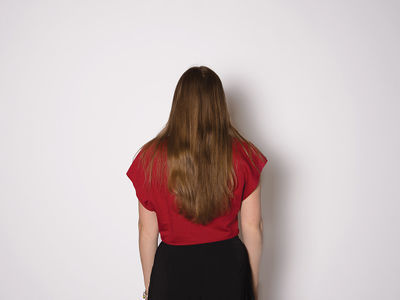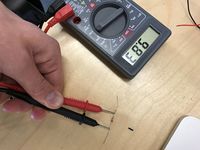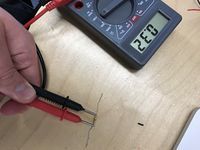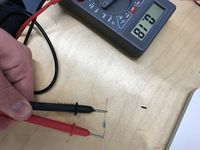Difference between revisions of "User:Ayo Villum"
Ayo Villum (talk | contribs) |
Ayo Villum (talk | contribs) |
||
| Line 47: | Line 47: | ||
we measured the different resisters so we knew the value. | we measured the different resisters so we knew the value. | ||
| + | |||
| + | |||
| + | –––––––––––––––––––––––––––––––––––––––––––––––––––––––––––––––––––––––––––––––––––––––––––––––––––––––––––––––––––––––––––––––––––––––––––––––––––––––––––––––––––––––– | ||
| + | '''Creating a circuit board''' | ||
| + | |||
| + | For this lesson we had to create our own touching pad circuit board. On it we had a small speaker that would make a sound when you touched the patches. We chose the number four scheme but soon figured that they where all the same but just in different orders. <br> <br> | ||
| + | |||
| + | First we tried to get the system printed on the coper plate. That worked very well. | ||
| + | We printed the system on the copper plate with the Mimaki printer in publication station and then went to the printing station where they have an acid bath. The system was there in 45 min and after that it had perfectly acid away the copper in the right places. | ||
| + | |||
| + | [[File:digi11.jpg|200px|left|Setup|]] | ||
| + | [[File:digi14.jpg|200px|middle|]] | ||
| + | |||
| + | |||
| + | |||
–––––––––––––––––––––––––––––––––––––––––––––––––––––––––––––––––––––––––––––––––––––––––––––––––––––––––––––––––––––––––––––––––––––––––––––––––––––––––––––––––––––––– | –––––––––––––––––––––––––––––––––––––––––––––––––––––––––––––––––––––––––––––––––––––––––––––––––––––––––––––––––––––––––––––––––––––––––––––––––––––––––––––––––––––––– | ||
| Line 55: | Line 70: | ||
[[File:Ff-cookies-9.png|500px|right|Setup|]] | [[File:Ff-cookies-9.png|500px|right|Setup|]] | ||
| − | '''Final project'''<br> | + | '''Final project'''<br><br> |
''Day one''<br> | ''Day one''<br> | ||
Most of us had a project in quarter 7 about data. <br> | Most of us had a project in quarter 7 about data. <br> | ||
| Line 148: | Line 163: | ||
Webcam and beemer facing each other. <br><br> | Webcam and beemer facing each other. <br><br> | ||
–––––––––––––––––––––––––––––––––––––––––––––––––––––––––––––––––––––––––––––––––––––––––––––––––––––––––––––––––––––––––––––––––––––––––––––––––––––––––––––––––––––––– | –––––––––––––––––––––––––––––––––––––––––––––––––––––––––––––––––––––––––––––––––––––––––––––––––––––––––––––––––––––––––––––––––––––––––––––––––––––––––––––––––––––––– | ||
| + | <br><br> | ||
| + | ''Day 5'' | ||
| + | [[File:rihanna.gif|500px|right|]] | ||
| + | Work work work youtube.com/watch?v=HL1UzIK-flA | ||
| + | |||
| + | –––––––––––––––––––––––––––––––––––––––––––––––––––––––––––––––––––––––––––––––––––––––––––––––––––––––––––––––––––––––––––––––––––––––––––––––––––––––––––––––––––––––– | ||
| + | <br><br> | ||
| + | ''Day 6''<br> | ||
| + | It works!<br> | ||
| + | |||
| + | test -findings: people where in general interacting. | ||
| + | How did they respond: Most people felt uncomfortable. Trying to hide from it. Laughing and trying to figure out where the camera was. | ||
| + | Succeeding in creating awareness and visibility. | ||
| + | |||
| + | |||
| + | |||
| + | NEXT --> Assesment! | ||
Revision as of 11:22, 21 June 2017
ayovkrogh@gmail.com
student number:
0941421
––––––––––––––––––––––––––––––––––––––––––––––––––––––––––––––––––––––––––––––––––––––––––––––––––––––––––––––––––––––––––––––––––––––––––––––––––––––––––––––––––––––––
This is Group 5. We did a small play to show how plus and minus electrons work when they are close and far from each other.
In action.
––––––––––––––––––––––––––––––––––––––––––––––––––––––––––––––––––––––––––––––––––––––––––––––––––––––––––––––––––––––––––––––––––––––––––––––––––––––––––––––––––––––––
In this lesson we where experimenting with small circuit boards and batteries.
This battery is good.
Original Readings:
Battery: -8.78V (We switched around the + and the -, so the reading is in -. But we saw and changed it so it was right, but forgot to picture it.)
Resistance: 470 ohms
Current: 13.8 mA
––––––––––––––––––––––––––––––––––––––––––––––––––––––––––––––––––––––––––––––––––––––––––––––––––––––––––––––––––––––––––––––––––––––––––––––––––––––––––––––––––––––––
Trying to understand the currents and resistance and calculating
––––––––––––––––––––––––––––––––––––––––––––––––––––––––––––––––––––––––––––––––––––––––––––––––––––––––––––––––––––––––––––––––––––––––––––––––––––––––––––––––––––––––
Measuring Voltage and Current
hfjdslgfahjlsfghdljfhsvaæ ––––––––––––––––––––––––––––––––––––––––––––––––––––––––––––––––––––––––––––––––––––––––––––––––––––––––––––––––––––––––––––––––––––––––––––––––––––––––––––––––––––––––
Here we measured the resister.
Volt 1th resistor 9.83 Volt / 2nd 0.32 Volt / 3th 0.18 Volt/ 1th + 2nd together 10.15 Volt / 2nd + 3th together 0,5 Volt / 1th +2nd +3th together 10.83
I = V/R 9,11: 9,83 = 0,93 9,11 : 10.83 = 0,84
we measured the different resisters so we knew the value.
––––––––––––––––––––––––––––––––––––––––––––––––––––––––––––––––––––––––––––––––––––––––––––––––––––––––––––––––––––––––––––––––––––––––––––––––––––––––––––––––––––––––
Creating a circuit board
For this lesson we had to create our own touching pad circuit board. On it we had a small speaker that would make a sound when you touched the patches. We chose the number four scheme but soon figured that they where all the same but just in different orders.
First we tried to get the system printed on the coper plate. That worked very well. We printed the system on the copper plate with the Mimaki printer in publication station and then went to the printing station where they have an acid bath. The system was there in 45 min and after that it had perfectly acid away the copper in the right places.
––––––––––––––––––––––––––––––––––––––––––––––––––––––––––––––––––––––––––––––––––––––––––––––––––––––––––––––––––––––––––––––––––––––––––––––––––––––––––––––––––––––––
––––––––––––––––––––––––––––––––––––––––––––––––––––––––––––––––––––––––––––––––––––––––––––––––––––––––––––––––––––––––––––––––––––––––––––––––––––––––––––––––––––––––
––––––––––––––––––––––––––––––––––––––––––––––––––––––––––––––––––––––––––––––––––––––––––––––––––––––––––––––––––––––––––––––––––––––––––––––––––––––––––––––––––––––––
––––––––––––––––––––––––––––––––––––––––––––––––––––––––––––––––––––––––––––––––––––––––––––––––––––––––––––––––––––––––––––––––––––––––––––––––––––––––––––––––––––––––
Final project
Day one
Most of us had a project in quarter 7 about data.
Ayo, refugees, from Syria to Denmark
Daisy, how to meet people
Tutu, postal service
Jess, had another project
We ended up having a general conversation on data and decided to focus on the kind of data we give up on the internet with special focus on Cookies.
We considered how much data we give away and how much we receive with Cookies. We are nudging ourselves to buy things by accepting Cookies.
Our actions has a chain reaction on your own reactions .
We determined that in the modern world we have a sense of free will. How we respond to our free will is down to the individual.
In conclusion we think we have our free will removed, however the only people successful on removing our free will is ourselves.
Eg. how we accept cookies
We want to conduct an experiment in order to visualize free will and how we are reacting to our own nudging. - how our behaviour is manipulated and causes a chain reaction.
We are thinking about causing an effect and intent to explore this digitally.
––––––––––––––––––––––––––––––––––––––––––––––––––––––––––––––––––––––––––––––––––––––––––––––––––––––––––––––––––––––––––––––––––––––––––––––––––––––––––––––––––––––––
Day 2
Gathering data!
Figuring out how “active” our free will is.
Weather we can take that away or just need to minimize it.
We set up a small experiment:
3 sheets of paper with three different questions. (1. Choose to sacrifice the 6 year old Hitler to save 6 million jews 2. Choose to kill the 6 year old Hitler to prevent Holocaust 3. Choose to sacrifice 6 year old Hitler for his possible behavior in the future) The sheets will have yes and no boxes you can tick off. The audience is restricted to only two answers.
This questionnaire is not about the questions, but the importance of the options.
Referances:
imdb.com/title/tt4044364/ - “Citizenfour” movie about Edward Snowden and data storage. This movie was very inspiring for me and it is a good narrative about data and how much you are sharing and how much is saved and stored FOREVER!!
––––––––––––––––––––––––––––––––––––––––––––––––––––––––––––––––––––––––––––––––––––––––––––––––––––––––––––––––––––––––––––––––––––––––––––––––––––––––––––––––––––––––
Day 3
Findings:
69 people took part. (the sheets was hanged in the male and female toilets)
By free will people attended the questionnaires and thereby used their free will but also restricted themselves and their freewill by only using the two possible answers.
The experiment demonstrated people willing to use their free will but they are also not considering the consequences. Our interactors were not provided with any information on the questions they were being asked nor did they question WHY they were being asked.
Using the posters we can identify and highlight that we have free will but we can restrict it very easily. Each individual decides how much their free will they want to give away. However they make an unconscious decision in the act of giving away their free will.
WHAT WE RECOGNISE:
We have free will
We use and abuse our free will
We don’t consider all of our unconscious actions
Everyday we make a series of steps that we don’t recognise as part of our everyday life
We behave with free will but we are entangled with multiple different systems both digital and physical and that influence and manipulate our behaviour
The majority of our actions our unconscious and this is also explored in our online behaviour
The amount of data that we give away and receive is dangerous.
If we were aware of it, how would we respond?
Would be happy?
Nervous?
Uncomfortable?
What we will do:
We need to speak to the station managers at the interaction station and discuss a way that we can digest our data into a digital piece.
In our artwork we want to explore cause and effect as a chain reaction. We want to observe people’s behaviour and demonstrate their ‘free will’ in action.
The beemer is showing us our unconscious choices and forcing us to face them head on. This will in most cases make people uncomfortable.
With this project we can make a focus and show people the consequences of Cookies and sharing data on the internet.
––––––––––––––––––––––––––––––––––––––––––––––––––––––––––––––––––––––––––––––––––––––––––––––––––––––––––––––––––––––––––––––––––––––––––––––––––––––––––––––––––––––––
Day 4
We are starting to think about making a product/project.
We are thinking about how we can demonstrate people’s behaviour to themselves.
We have considered how we develop an uncomfortable feeling in front of a camera, like a facetime camera or a hidden mirror, seeing ourselves take part in our actions is distressing.
We are trying to replicate this in our work.
Our intention is to create a ‘mirror’ that is constant. The idea is to trap the interactor in a moment, where they have to experience their behaviours over and over, the choices we make are literally visualised and the interactor can physically see the chain reaction in their actions.
At the interaction station they have recommended to us to use a webcam - a simple and easy means of displaying unconscious reactions.
We are currently working on programming a system where you would see your behaviour replicated over and over and over.
We are using MAX, a drag and drop operating system that is a simplistic coding method.
Mirror yourself. See your own reflection. We need to make it delayed.
Webcam and beemer facing each other.
––––––––––––––––––––––––––––––––––––––––––––––––––––––––––––––––––––––––––––––––––––––––––––––––––––––––––––––––––––––––––––––––––––––––––––––––––––––––––––––––––––––––
Day 5
Work work work youtube.com/watch?v=HL1UzIK-flA
––––––––––––––––––––––––––––––––––––––––––––––––––––––––––––––––––––––––––––––––––––––––––––––––––––––––––––––––––––––––––––––––––––––––––––––––––––––––––––––––––––––––
Day 6
It works!
test -findings: people where in general interacting. How did they respond: Most people felt uncomfortable. Trying to hide from it. Laughing and trying to figure out where the camera was. Succeeding in creating awareness and visibility.
NEXT --> Assesment!


















